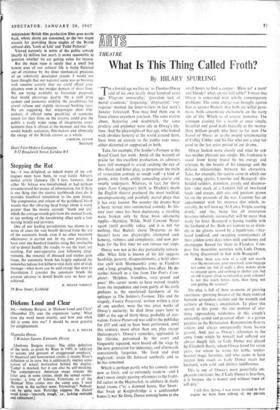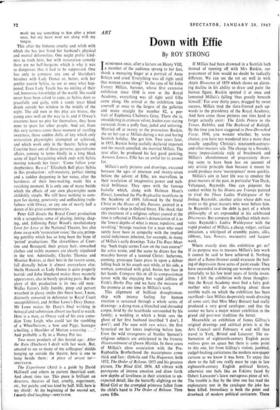What Is This Thing Called Froth?
THEATRE
By HILARY SPURLING
is a horrid age we live in,' as Thomas Otway
Take, for example, The Soldier's Fortune at the Royal Court last week. Amid all the warmth of praise for this excellent production, its admirers have still managed to avoid catching the eye of this bleak and bitter play, to perpetuate the myth of restoration comedy as rough stuff—a kind of pretty, witty froth archly concealing coarse and smutty underparts. Whereas, in fact, for thirty years from Congreve's birth to Dryden's death the English theatre produced the most truthful, uncompromising and painfully moral plays that it has ever known. No wonder the drama beat a hasty retreat into sentimental comedy. Its his- tory ever since has been depressing, a receding wave broken only by three brisk advancing ripples—Sheridan, Wilde, Noel Coward. Never again (until possibly today, and it is not for nothing that Beckett chose Descartes as his master) have our playwrights attempted such honesty, richness and complexity; and now per- haps for the first time we can retrace our steps. Otway was not in his day particularly remark- able. What little is known of his life suggests hardship, poverty, disappointments, a brief abor- tive spell with Monmouth's army in Flanders and a long, grinding, hopeless love affair. He de- scribes himself in a line from The Poet's Com- plaint: 'Helpless, friendless, very proud and poor.' His career seems to have moved steadily from the impudence and even gaiety of his early prefaces to the unrelieved harshness of the epilogue to The Soldier's Fortune. This and the tragedy, Venice Preserved, written within a year of one another, were the two great works of Otway's maturity; he died three years later in 1685 at the age of thirty-three, probably of star- vation. Venice Preserved was sold to the publisher for f15 and said to have been performed, until this century, more often than any play except Shakespeare's. Otway's comedies, applauded in his lifetime, patronised by the court and frequently repeated, were hissed off the stage by the next generation for indecency, and afterwards conveniently forgotten. 'He lived and died neglected,' wrote Dr Johnson sombrely, and so he has remained.
Which is perhaps partly why his comedy seems now so fresh, and so extremely modern—and I don't mean simply passing references to the fright- ful racket in the Haymarket, to adultery in shady hotel rooms ("tis a damned house, that Swan : that Swan at Knightsbridge is a confounded house,), nor Sir Davy Dunce coming home in the small hours to find a corpse: 'Bless us! a man! and bloody! what, on my hall table?' I mean that Otway is concerned with wholly contemporary problems. The same charge was brought against him as against Beckett, that both arc wilful pessi- mists, both concentrate exclusively on the nasty side of life. Which is, of course, nonsense. The common craving for a world at once simple, beautiful and good leads logically to the twenty- three million people who have so far seen The Sound of Music, or to the insipid sentimentality of Colley Cibber and his like who put a stop for good to the last great period in our drama.
Otway looked more closely and what he saw was neither pleasant nor simple. His frankness is saved from being brutal by his energy and courage, by the beauty of his language and the delicate relationships between his characters. Take, for example, the tavern scene in which our two young sparks, Courtinc and Beaugard—dis- banded soldiers, penniless, greedy and disconso- late—take stock of a London full of two-faced toads and creeps, dull cits and puritans grown fat on the proceeds of the war. Courtine has an appointment with his mistress (for which, in- evitably, he will turn up 'As I am a Virgin, roaring drunk,' and she, being like all restoration heroines infinitely resourceful, will be more than ready for him). Beaugard is having trouble with the husband of his. Both are content to sit drink- ing in the gloom, served by a lugubrious, ‘-..hey- faced landlord, and swapping reminiscences of their golden army days when milk and honey and champagne flowed for them in Flanders. Com- pare this masculine nostalgia with Lady Dunce, on being discovered in bed with Beaugard : What think you now of a cold wet march over the mountains, your men tired, your baggage
not come up, but at night a dirty watery plain to encamp upon, and nothing to shelter you, but an old leaguer cloak as tattered as your colours?
Is not this much better, now, than lying wet and getting the sciatica?
The play is full of these moments of piercing sweetness—piercing because of the sharp contrast between scrupulous realism and the warmth and richness of Otway's imagination. To place this speech at this point—the one moment of any- thing approaching tenderness in this couple's eminently sordid and practical affair—is a genius peculiar to the Restoration. Romanticism flowers seldom and always unexpectedly from barren ground. And, just as Otway's references to the army from which he himself had suffered are always deeply felt, so Lady Dunce was played by Elizabeth Barry, whom Otway loved for seven years, for whom he wrote his noble, tender- hearted tragic heroines, and who seems to have treated him much as Lady Dunce treats her husband, with cold and pitiless indifference.
This is one of Otway's most powerfully un- pleasant creations; but if Lady Dunce is heartless, it is because she is honest and without trace of self-pity'
1 tell thee, Sylvia, I was never married to that engine we have been talking of; my parents
made me say something to him after a priest once, but my heart went not along with my tongue.
This after the hideous cruelty and relish with which she has just listed her husband's physical and mental deformities. One might prefer kind- ness to truth here, but with restoration comedy there are no half-bargains which is why it was so dangerous that it had to be suppressed. One has only to compare any one of Sheridan's heroines with Lady Dunce or, better, with her gentler cousin Sylvia, to see at once what hap- pened. Even Lady Teazle has no inkling of their sad, humorous knowledge of the world. She could never have been asked to cope, as Sylvia does so gracefully and gaily, with a randy lover blind drunk outside her window in the middle of the night. The old men in this play are brutes, the young ones well on the way to it, and if Otway's creatures have no pity for themselves, they have none to spare for other people. And yet, from this very tartness come those moment of startling sweetness, those sudden shifts of key which only restoration playwrights attempted or achieved, and which work only in the theatre. Sylvia and Courtin have one of those perverse, quarrelsome affairs, coming to terms finally in a long bleak scene of legal bargaining which ends with Sylvia moving towards her lover: 'Come follow your shepherdess. Ba-a-a!' Elizabeth Bell plays Sylvia in this production : self-mockery, perfect timing and a sudden deepening in her voice, after the harshness of their love-making, made this a ravishing moment. It is only one of many beside which the effects of our own playwrights seem childishly simple. We still have nothing to com- pare for daring, generosity and unflinching truth- fulness with Otway, or any one of nearly half a dozen of his great contemporaries.
Peter Gill directs the Royal Court production with a scrupulous sense of placing, timing, shap- ing, and, following Peter Wood's revolutionary Love for Love at the National Theatre, has also done away with 'restoration voice,' the coy, primp- ing gentility which has so long been the bane of 'period' productions. The slovenliness of Cour- tine and Beaugard, their greasy hair, unwashed clothes and stable manners are clearly stipulated in the text. Admittedly, Charles Thomas and Maurice Raves, at their best in the tavern scene, fall dismally below it almost everywhere else; Sheila Hancock as Lady Dunce is quite properly horrid; and John Shepherd makes three masterly appearances, alas in barely speaking parts. But the glory of this production is its two old men: Wallas Eaton's Jolly Jumble, pimp and pervert
wreathed in glassy smiles (his finest hour, I note,
discreetly censored in deference to Royal Court susceptibilities), and Arthur Lowe's Davy Dunce. Mr Lowe makes Sir Davy's final writhing in betrayal and submission almost too hard to watch.
Here is a man, as Otway said of his own come- dian Tony Leigh, who could 'act the rumbling of a Wheelbarrow, a Sow and Piggs, Sausages a-boiling, a Shoulder of Mutton a-roasting . . And probably a fly in a Honey Pot too.
Two more products of this horrid age : After the Rain (Duchess) I dealt with last week. But,
amazed to see so many of my colleagues' shields hanging up outside the theatre, here is one to hang beside them : A piece of arrant tat—
SPECTATOR.
The Experiment (Arts) is a guide by David Halliwell and others to current theatrical cant. And about time too. This piece is brilliant on directors, theatres of fact, cruelty, experiment, etc., but patchy and too kind by half. Still, here is my shield: At the beginning of the second act, I nearly died laughing—smcrATon.



































 Previous page
Previous page